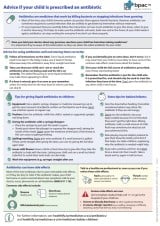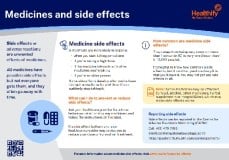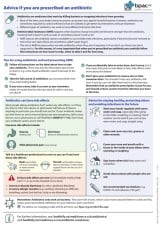If you're a frequent visitor to Healthify, why not share our site with a friend? Don't forget you can also browse Healthify without using your phone data.
Trimethoprim
Sounds like 'try-meth-oh-prim'
Key points about trimethoprim
- Trimethoprim is an antibiotic used to treat and prevent urine infections (also called urinary tract infections or UTIs).
- Trimethoprim is also called TMP® tablets.
- Find out how to take it safely and possible side effects.

Trimethoprim is an antibiotic that is used to treat and prevent urine infections (also called urinary tract infections or UTIs). It works by killing or stopping the growth of bacteria (bugs) and getting rid of the infection.
Can I get trimethoprim from my pharmacy without a prescription?
Pharmacists are able to sell trimethoprim for the treatment of UTIs. This is available without a prescription to women aged between 16 to 65 years, who aren't pregnant and don't have any other complicating factors.
Only pharmacists who have completed additional training can supply trimethoprim. They'll need to ask you questions to make sure it's the best option for you.
In Aotearoa New Zealand, trimethoprim is available as tablets (300 mg).
- Always take your trimethoprim exactly as your healthcare provider has told you. The pharmacy label on your medicine will tell you how much trimethoprim to take, how often to take it, and any special instructions.
- To treat an infection: The usual dose for adults with an infection is 1 tablet (300 mg), each night. Your healthcare provider or pharmacist will advise you how long to take trimethoprim for (usually 3 to 7 days).
- To prevent an infection: The dose to prevent infection is half a tablet (150 mg) at night. If you have frequent urine infections, you'll have to take trimethoprim each night for a few months to prevent recurrent infections.
- Timing of your dose: Trimethoprim is best taken before bedtime. Take trimethoprim at the same time each day.
- Food: You can take trimethoprim with or without food. If you get stomach upset, try taking it with food.
- Splitting tablets: If your dose is half a tablet, you can split the tablet into two by either breaking the tablet along a scored line or using a tablet cutter. You can buy a tablet cutter from your pharmacy. If you have trouble splitting your tablets, talk to your pharmacist – they can do this for you. It’s important to halve tablets correctly because uneven splitting or crumbling changes the dose.
- Missed dose: If you forget to take trimethoprim, take it as soon as you remember. But, if it's nearly time for your next dose, just take the next dose at the usual time. Don't take double the dose.
- Finish the course: It's best to take the whole course of antibiotics for the number of days your healthcare provider has told you to. Don't stop taking it, even if you feel your infection has cleared up.
Here are some things to know when you're taking trimethoprim. Other things may be important as well, so ask your healthcare provider what you should know about.
- Alcohol: Trimethoprim doesn't have direct interaction with alcohol. This means that most people could have the occasional drink while taking it without any serious problems. However, if trimethoprim makes you feel sick (nausea), don't drink alcohol as it will make you feel worse.
- Other medicines: Trimethoprim interacts with some medicines, herbal supplements and rongoā Māori, so check with your healthcare provider before starting trimethoprim and before starting any new products.
- If you're taking the contraceptive pill: You don't usually need to use additional contraception if you're taking trimethoprim. But if you have diarrhoea (runny poo) or vomiting (being sick) lasting more than 24 hours, absorption of the contraceptive pill may be affected. If this happens, ask your healthcare provider or pharmacist for advice about contraception over the following few days.
- Driving: Trimethoprim can make you feel tired or dizzy. If this happens, limit or avoid drinking alcohol. Be careful when driving or using tools until you know how this medicine affects you.
- Pregnancy or breastfeeding: Talk to your healthcare provider if you're pregnant, planning a pregnancy or want to breastfeed.
Like all medicines, trimethoprim can cause side effects, although not everyone gets them. If you're concerned about any symptoms you think might be related to your medicine, talk to your healthcare provider. The following information offers some guidance but doesn't include all possible side effects.
Common side effects
Tell your healthcare provider if these side effects bother you.
- Headache, not feeling hungry.
- Nausea (feeling sick): Try taking trimethoprim with food.
- Vomiting (being sick) or diarrhoea (runny poo): Tell your healthcare provider if your diarrhoea is severe, contains blood or lasts more than a few days. If you have a lot of diarrhoea or have been vomiting and you're taking the oral contraceptive pill, let your healthcare provider know.
- Difficulty sleeping.
- Itching or a mild rash.
Tell your healthcare provider immediately or phone Healthline free on 0800 611 116 if these occur
- Signs of high levels of potassium in your blood such as changes in heartbeat, muscle cramps or weakness.
- Signs of problems with your liver such as yellowing of the skin or eyes, pain in the abdomen.
- Sore throat or mouth, fever, rash, bruising or bleeding.
Phone 111 for an ambulance or go to your nearest accident and emergency (A&E) clinic if these occur
- Signs of an allergic reaction such as itchy skin, and rash, swollen lips or tongue, problems breathing, like a tight chest or shortness of breath.
Read more about medicines and side effects and reporting a reaction you think might be a side effect.
The following links provide further information on trimethoprim:
Trimethoprim(external link) New Zealand Formulary Patient Information
TMP tablet(external link) Medsafe Consumer Information Sheet
Brochures
Advice if you are prescribed an antibiotic(external link) BPAC, NZ, 2024
Advice if your child is prescribed an antibiotic(external link) BPAC, NZ, 2024
Medicines and side effects(external link) Healthify He Puna Waiora, NZ, 2024
5 questions to ask about your medications(external link) Health Quality and Safety Commission, NZ, 2019 English(external link), te reo Māori(external link)
References
- Trimethoprim(external link) New Zealand Formulary
- TMP(external link) Medsafe datasheet, NZ
- Urinary tract infections (UTIs) – an overview of lower UTI management in adults(external link) BPAC, NZ, 2025
- Antibiotic guide – choices for common infections(external link) BPAC, NZ, 2023
Brochures

Advice if your child is prescribed an antibiotic
BPAC, NZ, 2024

Medicines and side effects
Healthify He Puna Waiora, NZ, 2024
Credits: Healthify editorial team. Healthify is brought to you by Health Navigator Charitable Trust.
Reviewed by: Stephanie Yee, Pharmacist, Auckland.
Last reviewed:






